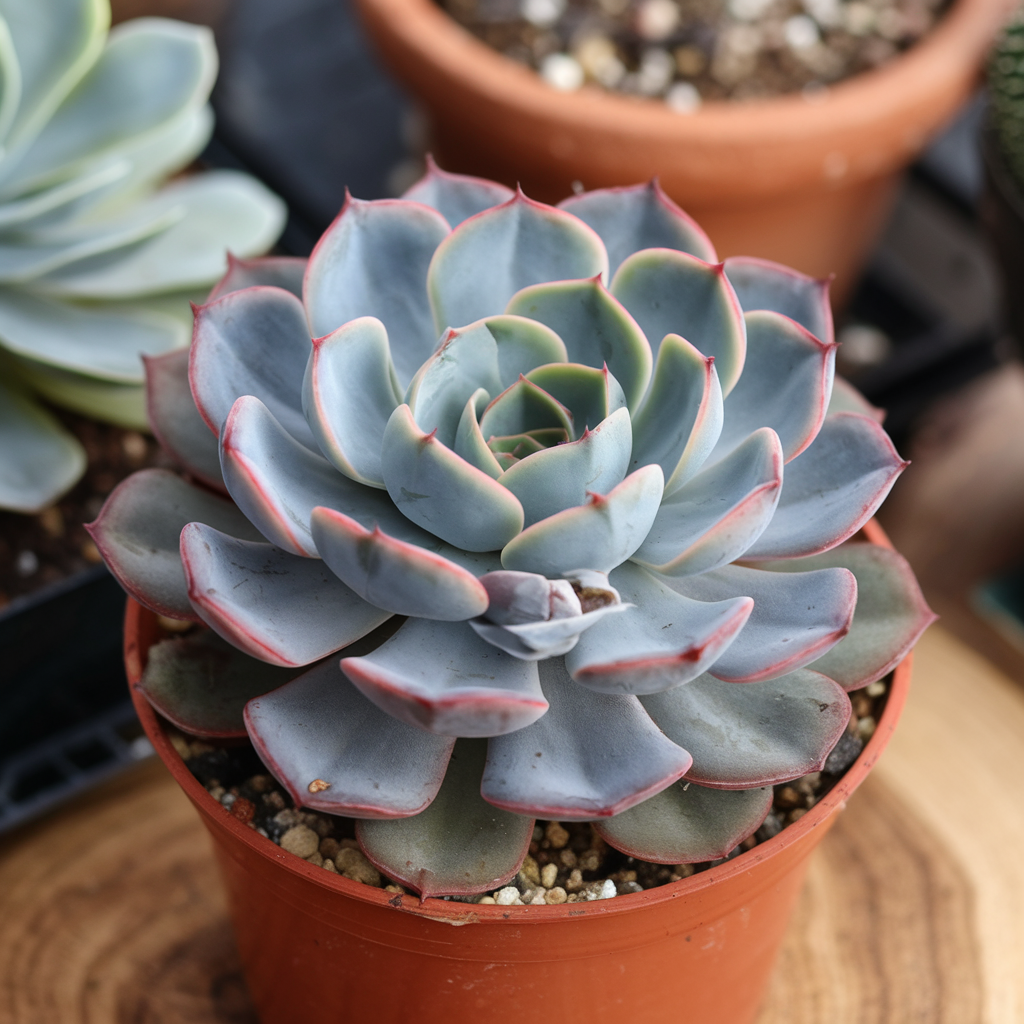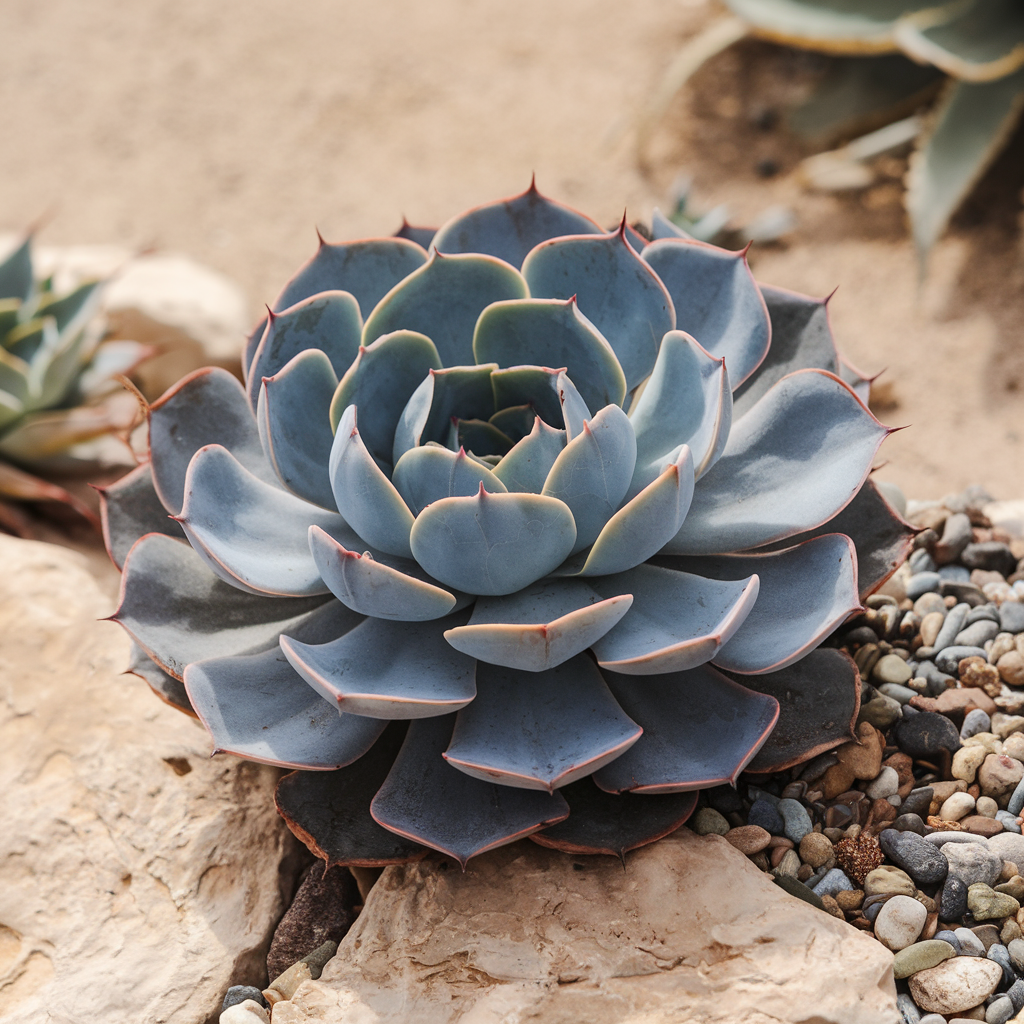How Big Does An Echeveria Atlantis Get?
How Big Does An Echeveria Atlantis Get? Hailing from Mexico, Echeveria Atlantis is a vibrant, rosette-shaped succulent replete with powdery blue leaves with a very thin pink margin that feature a unique ripple across the span of each leaf. This variety, which is also known as “Peaches and Cream,” obtains its distinctive creamy hue and…
How Big Does An Echeveria Atlantis Get?
Hailing from Mexico, Echeveria Atlantis is a vibrant, rosette-shaped succulent replete with powdery blue leaves with a very thin pink margin that feature a unique ripple across the span of each leaf.
This variety, which is also known as “Peaches and Cream,” obtains its distinctive creamy hue and texture from a thick coating of farina, which is a powdered material meant to protect the leaves from the sun’s harsh rays.
This gives the variety its distinctive creamy coloration and texture.
This type is a wonderful addition to any temperate garden or mixed container planting, and it will reach a width of up to 8 inches when it matures.
The green tones of other succulent plants provide the perfect backdrop for the bright pop of colour that this variety offers.


How Can I Make An Echeveria Atlantis To Be Bushy?
Echeveria Atlantis is a beautiful succulent that is native to Mexico. It is a member of the Crassulaceae family. If you’re looking to make your Echeveria Atlantis more bush, there are a things you can do to encourage bushy growth.
When your plant is young, it has a habit of growing in an upward direction. To help it develop its branches and to prevent them from becoming thin, thin the rosettes when they are still young but have developed their third true leaf.
You can do the following to encourage it to be bushy;
Provide Adequate Sunlight
When growing echeveria Atlantis, provide bright light to encourage a full, bushy plant. Adequate sunlight will also help prevent stretching and etiolation.
If echeveria Atlantis is not receiving enough light, the leaves will become pale and the plant will become leggy. To keep your plant compact and full, provide bright light and pinch back the stems as needed.
Repotting
Echeveria Atlantis is a beautiful succulent that can thrive indoors or outdoors. One way to encourage bushiness is to repot the plant every few years.
This will help to encourage new growth and prevent the plant from becoming root bound. When repotting, be sure to use a well-draining potting mix and a pot that is only slightly larger than the current one.
After repotting, water the plant thoroughly and then allow it to dry out completely before watering again.
With proper care, your Echeveria Atlantis will stay healthy and continue to produce new growth.
Proper Fertilization
An Echeveria Atlantis can be a beautiful, bush addition to any home. But, like any plant, it needs the right care to truly thrive.
One important aspect of care for an Echeveria Atlantis is proper fertilization. Fertilizing an Echeveria Atlantis is important because it helps the plant to grow strong and healthy.
It also helps to encourage new growth, which can make the plant bushier. When fertilizing an Echeveria Atlantis, it is important to use a light hand.
Too much fertilizer can actually damage the plant. The best time to fertilize an Echeveria Atlantis is summer.
Proper Pruning
One way to make an Echeveria atlantis bushier is by proper pruning. When you prune, you remove dead leaves and stems, which encourages new growth. You can prune an Echeveria Atlantis as often as every couple of weeks to keep it bushier.
Water Wisely
When watering an Echeveria Atlantis, be sure to water only when the soil is completely dry. Any excess water that is not absorbed by the soil can damage roots, which could result in dieback or death.
If your Echeveria Atlantis is going to be outside during the summer months, plan on using a well-draining potting mix for your container and water it thoroughly when the soil is completely dry.
Does Echeveria Atlantis Go Into Dormancy Period?
Echeveria Atlantis is a beautiful succulent that is native to Mexico. It is a member of the Crassulaceae family. If you’re curious whether or not your Echeveria Atlantis will go into dormancy, there are a things you should know.
Echeveria Atlantis does go into dormancy period and it typically happens during winter months.
The plant does go through a dormancy period, typically in the winter months. During this time, the plant will stop growing and the leaves will start to wrinkled and fall off.
Do not be alarmed, this is normal. The plant will start to grow again in the springtime when the weather starts to warm up.
What Are The Benefits Of Growing Echeveria Atlantis?
There are many benefits to growing echeveria Atlantis, an awesome succulent plant. Some of the benefits and features include:
It Is A Low Maintenance Plant
Echeveria Atlantis is a low maintenance plant.
It is native to Mexico and can flourish in the proper care. You need to water them only when the soil becomes completely dry.
In nature, echeveria Atlantis plant gets plenty of rainwater and doesn’t need watering even during the summer season. Furthermore, it is great for beginners and easy to propagate.
It Is A Drought Tolerant Plant
Echeveria Atlantis is a drought tolerant plant. This succulent is native to Mexico and can tolerate long periods of drought.
When growing an echeveria Atlantis, you don’t need to water it too much as it grows in native habitat. However, you still need to water the plant during hot summer days when there is a drought. Only water it when the soil gets completely dry.
It Is A Pest Resistant Plant
An echeveria Atlantis is a pest resistant plant. There are a few known pests, diseases, or insects that infect Echeveria.
It is native to Mexico and the plant doesn’t attract any pests. If your plant does get aphids that suck the juices from the leaves it can be easily treated by blasting them off with a strong spray of water and soap.
It Is An Attractive Plant
Echeveria Atlantis has stunning shape and beautiful leaves which are a deep green colour.
You can use it in the landscape to add colour and beauty to any area. It is a striking plant with its amazing foliage. With proper care, your echeveria Atlantis will provide you with an awesome display of foliage all year long.
It Is An Air Purifier
The plant is an air purifier.
It can help to keep indoor air clean and fresh. Echeveria Atlantis absorb carbon dioxide, a gas that is produced by the body and other household appliances, and release oxygen during photosynthesis.
This means that it helps to clean indoor air.
It Is A Great Container Plant
As mentioned above, Echeveria Atlantis loves the sun and thrives when it has proper care. Container gardening is a great way to enjoy your plants, especially when it comes to Echeveria Atlantis.
Planting your echeveria in a shallow container can add colour to your space and provide the right amount of care for your succulent.
Why Is My Echeveria Atlantis Turning Yellow?
An Echeveria Atlantis can be a beautiful plant. But, like any plant, your Echeveria Atlantis will need the proper care to remain healthy and lush.
There are several factors that can cause yellowing and wilting. The following are the factors that causes Echeveria Atlantis to turn yellow.
Overwatering
If you overwater your Echeveria Atlantis, the leaves will begin to turn yellow. This is because the roots are not getting enough oxygen and are beginning to rot.
If you see the leaves beginning to turn yellow, immediately stop watering and allow the plant to dry out. Once the plant has dried out, you can begin watering again, but be sure to water only when the soil is dry.
Over Fertilization
If you use too much fertilizer, your Echeveria Atlantis could begin to turn yellow. The leaves will turn yellow if there is not enough oxygen in the soil. This is because the roots are crushed by the buildup of fertilizer in the soil.
If you notice that your plant is turning yellow, there is a good chance that it is from being over fertilized. Stop using fertilizer altogether.
You can begin fertilizing again but use half the recommended amount of fertilizer for your Echeveria Atlantis.
Too Much Sunlight
If your Echeveria Atlantis is being subjected to too much sunlight, it can cause the leaves to turn yellow. During the summer months, you may have to move your plant indoors or put it in a shadier area of your garden. This is because too much sunlight can burn the leaves.
Your Echeveria Atlantis should be exposed to sunlight only during the day and should be placed in a location that gets indirect sunlight in the afternoon or early evening. This is because too much heat will cause leaf yellowing and wilting.
Pests Infestation
An Echeveria Atlantis can attract pests. Aphids are one type of pest that will infest your Echeveria Atlantis. They suck the juices out of the leaves and causes the leaves to turn yellow and wilt.
If you notice that your Echeveria Atlantis is infested with aphids, there are a few things that you can do to get rid of them.
The most effective way is to blast the aphids off of the plant with a strong spray of water and soap. This will kill the pests.
Diseases Infestation
Diseases can also cause Echeveria Atlantis to turn yellow. This is because the plant is trying to tell you that there is a problem.
Make sure your Echeverias are never submerged in water. Otherwise, root rot and other fungal infections will become more common.
Consistent wetness causes root rot. As a result, bacterial infections develop.
In any case, the good news is that it is simple to avoid. Avoid overwatering and pick a soil that drains properly.
How Much Light Does Echeveria Atlantis Need?
Succulents like the Echeveria Atlantis do best in strong light. In any case, it is essential to shield them from direct sunlight as much as possible, particularly during the warmer months of the year when it is more likely to produce sunburn and stress.
During the first few weeks, you should make an effort to acclimate them by putting them in a spot that is somewhat shaded and only receives the morning sun for a few hours on a daily basis.
Then, over the course of a week or so, gradually increase the amount of sunshine that they are exposed to until they are in full light.
If the foliage is burnt, the best thing to do is to remove the rosette from the plant. This is the best course of action in this situation.
It is possible to use the leaf that you have removed for the purpose of propagation if it is not too damaged.
Place them in the room with the brightest window throughout the winter months, or keep them under fluorescent grow lights on a 12 to 14-hour cycle.